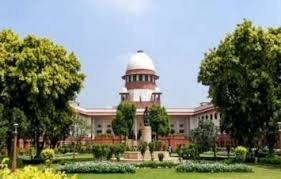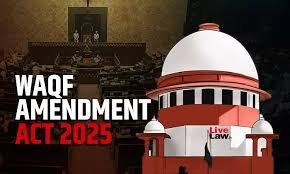
The Supreme Court of India on Tuesday, May 20, emphasized that any law passed by Parliament is assumed to be constitutional unless there is a clear and serious violation of the Constitution. This statement came during a hearing of petitions challenging the newly enacted Waqf (Amendment) Act, 2025. The Constitution Bench, led by Chief Justice B R Gavai and Justice A G Masih, heard the matter. Chief Justice of India (CJI) D Y Chandrachud also made a key observation on the legal principles governing such laws.
During the hearing, the Central Government requested the Supreme Court to limit the scope of the arguments to just three core issues. These included: (1) the powers of Waqf Boards to de-notify properties, (2) whether properties declared Waqf by a court, a user, or a deed could be reversed, and (3) whether certain powers of the Waqf Boards were constitutionally valid.
However, this request was strongly opposed by senior advocates Kapil Sibal and Abhishek Manu Singhvi, who appeared for the petitioners. They argued that the Waqf Amendment Act is a significant piece of legislation and should not be broken down into parts or evaluated in a piecemeal fashion. According to them, the court must look at the law in its entirety to determine its constitutionality.
Chief Justice D Y Chandrachud made it clear that laws made by Parliament are presumed constitutional. He emphasized that courts should not intervene unless there is a clear and serious violation of the Constitution. Echoing this sentiment, CJI Gavai stated, “Unless there is a serious issue, courts are not expected to interfere,” and added that under the current legal context, no further clarification was needed at this stage.
The debate also touched upon religious practices and the differences in offerings at places of worship. Kapil Sibal argued that mosques, unlike temples, do not receive offerings, making them more susceptible under the new law. He further claimed that the law appeared to target properties classified as “Waqf by user”, citing the example of the Babri Masjid.
Responding to this, CJI Gavai shared his own perspective by saying, “I have visited dargahs, churches… every place receives offerings.” This statement was meant to convey that religious donations or contributions are not exclusive to temples, and that all religious institutions receive offerings from the faithful in different forms.
Another major point of discussion was the mandatory registration of Waqf properties. The court wanted to know whether previous Waqf laws had made registration compulsory. Kapil Sibal stated that since 1954, all amendments required registration of Waqf properties, and that the word “shall” in the law meant it was mandatory.
However, the bench questioned whether the use of the word “shall” alone was enough to make registration truly mandatory. Sibal clarified that there had been confusion over whether this requirement originated from the 1954 amendment or even earlier from 1923. He also pointed out that while registration may have been required, the older laws did not mention any consequences for failing to register a property, thus reducing the legal impact of non-registration.
The petitioners also brought up a constitutional argument regarding Article 25 of the Indian Constitution, which guarantees the freedom to practice one’s religion. They claimed that the amended Waqf law violates Article 25 by taking away citizens’ rights to manage and worship at Waqf properties.
Kapil Sibal specifically referred to ASI-protected sites, stating that under the new law, such sites cannot be considered Waqf, and this indirectly strips citizens of their religious freedom. In response, Chief Justice Chandrachud asked, “Does this law take away your right to practice your religion?” He added that he had seen devotees praying freely at an ASI-protected temple in Khajuraho.
Sibal responded by saying that the law’s blanket declaration that certain properties are not Waqf does infringe on religious rights, especially when these properties have been used for worship historically. He argued that such a declaration undermines the rights of religious communities to control and access their religious spaces.The Supreme Court acknowledged the arguments presented, particularly the claim that the law violates Article 25, and stated that further observations will be made in the next hearing. The matter remains under judicial consideration, and the court has reserved its decision for a later date.































